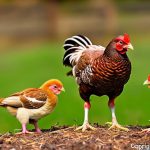Snakes are complex reptiles that have long been a source of both fear and intrigue. To effectively protect a chicken coop from snake intrusion, it’s essential to understand their behavior. As ectothermic animals, snakes rely on external heat sources to regulate their body temperature, often seeking sunny spots or warm areas.
They are known for their patient hunting style, often waiting motionlessly for prey to approach. Snakes possess excellent climbing abilities, allowing them to scale fences and walls with ease. They are attracted to areas with abundant food sources, such as rodents and birds, making chicken coops potential targets.
Snakes have a highly developed sense of smell, using their forked tongues to collect scent particles from the air to locate prey. Their flexible bodies enable them to squeeze through small openings, facilitating undetected entry into enclosed spaces. Understanding these behavioral traits is crucial when designing and maintaining a snake-proof chicken coop.
By considering factors such as a snake’s climbing ability, hunting patterns, and physical capabilities, one can implement effective strategies to deter these reptiles and safeguard poultry from potential attacks.
Table of Contents
- 1 Creating a Snake-Proof Chicken Coop
- 2 Using Natural Repellents
- 3 Keeping the Surrounding Area Clear
- 4 Installing Snake Fencing
- 5 Using Predators to Keep Snakes at Bay
- 6 Regularly Inspecting and Maintaining the Chicken Coop
- 7 FAQs
- 7.1 What are some natural ways to keep snakes away from my chickens?
- 7.2 Are there any predator-proofing measures I can take to keep snakes away from my chickens?
- 7.3 What are some signs that snakes may be present near my chicken coop?
- 7.4 Are there any specific snake-repelling plants that I can grow around my chicken coop?
- 7.5 Should I use chemical snake repellents around my chicken coop?
Key Takeaways
- Snakes are attracted to warm, dark, and sheltered areas, and they are excellent climbers and swimmers.
- Use 1/4 inch hardware cloth to cover all openings and create a barrier to prevent snakes from entering the coop.
- Natural repellents such as cinnamon, clove, and cedar oil can be used to deter snakes from the coop area.
- Keep the area around the chicken coop clear of debris, tall grass, and woodpiles to reduce hiding spots for snakes.
- Install a snake-proof fence around the perimeter of the coop, burying it at least 6 inches deep and angling it outward to prevent snakes from burrowing underneath.
- Encourage natural predators like cats, dogs, and certain bird species to help keep snake populations in check around the coop.
- Regularly inspect the coop for any signs of snake activity and maintain the integrity of the snake-proofing measures.
Creating a Snake-Proof Chicken Coop
Inspect and Seal the Coop
When it comes to protecting your chickens from snakes, prevention is key. Start by inspecting your coop for any potential entry points, such as gaps in the walls, holes in the floor, or openings around doors and windows. Seal off these areas using hardware cloth or wire mesh to prevent snakes from slithering in.
Maintain a Clean and Clutter-Free Coop
It’s also important to keep the coop clean and free of debris, as snakes are attracted to cluttered areas where they can hide and seek out prey. Regularly remove any piles of wood, rocks, or other potential hiding spots around the coop to deter snakes from taking up residence.
Elevate and Fortify the Coop
Another important aspect of creating a snake-proof chicken coop is to elevate it off the ground. This will make it more difficult for snakes to gain access to the coop and provide an added layer of protection for your chickens. Additionally, consider installing a concrete or metal barrier around the perimeter of the coop to further deter snakes from entering.
By taking these proactive measures, you can create a secure environment for your chickens and minimize the risk of snake encounters.
Using Natural Repellents

Natural repellents can be an effective way to keep snakes away from your chicken coop without resorting to harmful chemicals or traps. There are several natural substances that snakes find unappealing and will avoid, making them a safe and eco-friendly option for deterring these reptiles. One popular natural repellent is cinnamon oil, which has a strong scent that snakes dislike.
Simply sprinkle a few drops of cinnamon oil around the perimeter of your coop to create a barrier that snakes will be reluctant to cross. Another natural repellent is clove oil, which has a pungent odor that snakes find offensive. Mix a few drops of clove oil with water and spray it around the coop to create a deterrent for snakes.
You can also use garlic as a natural snake repellent by crushing cloves and scattering them around the coop. Snakes are repelled by the strong odor of garlic and will steer clear of areas where it is present. Additionally, essential oils such as cedarwood, lemongrass, and peppermint are known for their ability to repel snakes due to their strong scents.
Mix a few drops of these essential oils with water and spray the solution around the perimeter of your coop to create a natural barrier against snakes. By using natural repellents, you can effectively keep snakes at bay while ensuring the safety of your chickens and the environment.
Keeping the Surrounding Area Clear
In addition to securing your chicken coop, it’s important to keep the surrounding area clear of potential snake habitats. Snakes are attracted to areas with tall grass, dense vegetation, and piles of debris where they can hide and seek out prey. By keeping the area around your coop clear and well-maintained, you can reduce the likelihood of snakes taking up residence near your chickens.
Regularly mow the grass, trim back overgrown vegetation, and remove any piles of wood or rocks that could provide hiding spots for snakes. This will not only make your property less appealing to snakes but also create a safer environment for your chickens. It’s also important to keep food sources for snakes in check by controlling rodent populations around your coop.
Rodents are a primary food source for many snake species, so reducing their numbers can help deter snakes from venturing near your chickens. Use traps or natural predators such as cats or owls to keep rodent populations in check and minimize the risk of attracting snakes to your property. By keeping the surrounding area clear and free of potential snake habitats, you can create a more secure environment for your chickens and reduce the likelihood of snake encounters.
Installing Snake Fencing
Installing snake fencing around your chicken coop is an effective way to create a physical barrier that prevents snakes from gaining access to your flock. Snake fencing is typically made of fine mesh wire that is buried several inches into the ground and extends several feet above the surface. This prevents snakes from burrowing under or climbing over the fence and provides a secure enclosure for your chickens.
When installing snake fencing, be sure to bury the bottom edge several inches into the ground and angle it outward to prevent snakes from digging underneath. Additionally, ensure that the fence is tall enough to prevent snakes from climbing over it and gaining access to your coop. It’s important to regularly inspect and maintain snake fencing to ensure that it remains effective at keeping snakes out.
Check for any signs of damage or wear and tear, such as holes or gaps in the mesh, and repair them promptly to prevent snakes from exploiting weak points in the fence. Additionally, keep vegetation trimmed back from the fence line to prevent snakes from using it as a bridge to gain access to your coop. By installing and maintaining snake fencing around your chicken coop, you can create a secure barrier that effectively deters snakes and protects your flock from harm.
Using Predators to Keep Snakes at Bay

Feline Snake Hunters
Cats are particularly effective at hunting and catching snakes due to their agility and hunting instincts. By allowing cats to roam around your property, you can create a natural deterrent for snakes and reduce the risk of encounters with your chickens.
Canine Snake Deterrants
Dogs are also effective at keeping snakes away from your property due to their keen sense of smell and protective instincts. Certain breeds such as terriers and ratting dogs are known for their ability to hunt down and eliminate snakes, providing an added layer of protection for your chickens.
Avian Snake Predators
Additionally, certain bird species such as owls are natural predators of snakes and can help keep their populations in check around your property. By encouraging these natural predators to frequent your property, you can create a more secure environment for your chickens and reduce the risk of snake encounters.
Regularly Inspecting and Maintaining the Chicken Coop
Regular inspections and maintenance of your chicken coop are crucial for keeping it snake-proof and ensuring the safety of your flock. Inspect the coop regularly for any signs of damage or wear and tear, such as holes in the walls or gaps in doors and windows that could provide entry points for snakes. Repair any damage promptly using hardware cloth or wire mesh to prevent snakes from gaining access to the coop.
Additionally, keep the coop clean and free of clutter, as snakes are attracted to areas where they can hide and seek out prey. It’s also important to regularly clean out nesting boxes and remove any spilled feed or debris that could attract rodents, which in turn attract snakes. By keeping the coop clean and well-maintained, you can create a less appealing environment for snakes and reduce the likelihood of encounters with your chickens.
Regular inspections also allow you to identify any potential issues with snake activity early on and take proactive measures to address them before they become a problem. By regularly inspecting and maintaining your chicken coop, you can ensure that it remains snake-proof and provides a secure environment for your flock. In conclusion, protecting your chicken coop from snakes requires a combination of understanding their behavior, implementing preventive measures, using natural repellents, keeping the surrounding area clear, installing snake fencing, using predators as deterrents, and regularly inspecting and maintaining the coop.
By taking these proactive measures, you can create a secure environment for your chickens and minimize the risk of snake encounters. Understanding the behavior of snakes is crucial for developing effective strategies to keep them at bay and ensure the safety of your flock. By creating a snake-proof chicken coop, using natural repellents, keeping the surrounding area clear, installing snake fencing, using predators as deterrents, and regularly inspecting and maintaining the coop, you can effectively protect your chickens from snake attacks and create a safe environment for them to thrive.
If you’re looking for ways to keep snakes away from your chickens, you may also be interested in learning about large chicken coop ideas. A larger coop can provide more space for your chickens to roam and may help deter snakes from entering the area. Check out this article on large chicken coop ideas for more information on creating a safe and spacious environment for your flock.
FAQs
What are some natural ways to keep snakes away from my chickens?
Some natural ways to keep snakes away from your chickens include keeping the coop area clean and free of debris, using essential oils such as cinnamon or clove to create a barrier, and keeping the grass and vegetation around the coop trimmed.
Are there any predator-proofing measures I can take to keep snakes away from my chickens?
Yes, you can predator-proof your coop by installing hardware cloth around the perimeter, using a secure locking system on the coop doors, and adding a predator apron or skirt to prevent snakes from burrowing under the coop.
What are some signs that snakes may be present near my chicken coop?
Some signs that snakes may be present near your chicken coop include shed snake skins, snake tracks in the dirt, and the sudden disappearance of eggs or small chicks.
Are there any specific snake-repelling plants that I can grow around my chicken coop?
Yes, some snake-repelling plants include marigolds, lemongrass, and wormwood. These plants can help deter snakes from coming near your chicken coop.
Should I use chemical snake repellents around my chicken coop?
It is not recommended to use chemical snake repellents around your chicken coop, as they can be harmful to the chickens and the environment. It is best to use natural and non-toxic methods to keep snakes away.
Meet Walter, the feathered-friend fanatic of Florida! Nestled in the sunshine state, Walter struts through life with his feathered companions, clucking his way to happiness. With a coop that’s fancier than a five-star hotel, he’s the Don Juan of the chicken world. When he’s not teaching his hens to do the cha-cha, you’ll find him in a heated debate with his prized rooster, Sir Clucks-a-Lot. Walter’s poultry passion is no yolk; he’s the sunny-side-up guy you never knew you needed in your flock of friends!







